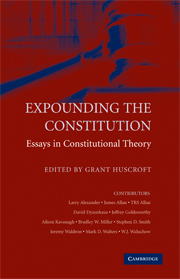Book contents
- Frontmatter
- Contents
- Preface
- Contributors
- Introduction
- PART I MORALITY AND THE ENTERPRISE OF INTERPRETATION
- PART II JUDICIAL REVIEW, LEGITIMACY, AND JUSTIFICATION
- 5 Constitutions, Judicial Review, Moral Rights, and Democracy: Disentangling the Issues
- 6 The Incoherence of Constitutional Positivism
- 7 The Travails of Justice Waldron
- 8 Deference or Defiance? The Limits of the Judicial Role in Constitutional Adjudication
- PART III WRITTEN AND UNWRITTEN CONSTITUTIONAL PRINCIPLES
- Index
8 - Deference or Defiance? The Limits of the Judicial Role in Constitutional Adjudication
Published online by Cambridge University Press: 25 July 2009
- Frontmatter
- Contents
- Preface
- Contributors
- Introduction
- PART I MORALITY AND THE ENTERPRISE OF INTERPRETATION
- PART II JUDICIAL REVIEW, LEGITIMACY, AND JUSTIFICATION
- 5 Constitutions, Judicial Review, Moral Rights, and Democracy: Disentangling the Issues
- 6 The Incoherence of Constitutional Positivism
- 7 The Travails of Justice Waldron
- 8 Deference or Defiance? The Limits of the Judicial Role in Constitutional Adjudication
- PART III WRITTEN AND UNWRITTEN CONSTITUTIONAL PRINCIPLES
- Index
Summary
INTRODUCTION
We are all familiar with infamous cases from various jurisdictions, in which judges have refrained from striking down grossly unjust legislative provisions or refused to overturn unjust decisions made by the executive branch. Rather than use the legal tools at their disposal to oppose such measures, judges have, instead, chosen to defer to the elected branches of government. Some of the most notoriously acquiescent decisions are handed down in time of war or when there is a perceived threat to national security, but deferential judicial decision-making is, by no means, confined to these circumstances. Although judicial deference has attracted the criticism that it represents an abdication of the judicial duty to enforce human rights, it has also attracted some notable support. Thus, Alexander Bickel argued that rather than being a judicial vice, a degree of deference to the elected branches of government was one of the “passive virtues” that good judges should display.
In this chapter I will address two main questions: (1) Why do judges sometimes refrain from using the full amplitude of their powers to adjudicate constitutional issues and prefer, instead, to defer to the elected branches of government, and (2) should they defer? Are there reasons why judges ought to be deferential rather than defiant? In other words, is there some virtue in judicial deference as Bickel suggests, or is deference a vice to be avoided by self-respecting judges?
- Type
- Chapter
- Information
- Expounding the ConstitutionEssays in Constitutional Theory, pp. 184 - 216Publisher: Cambridge University PressPrint publication year: 2008
- 10
- Cited by



